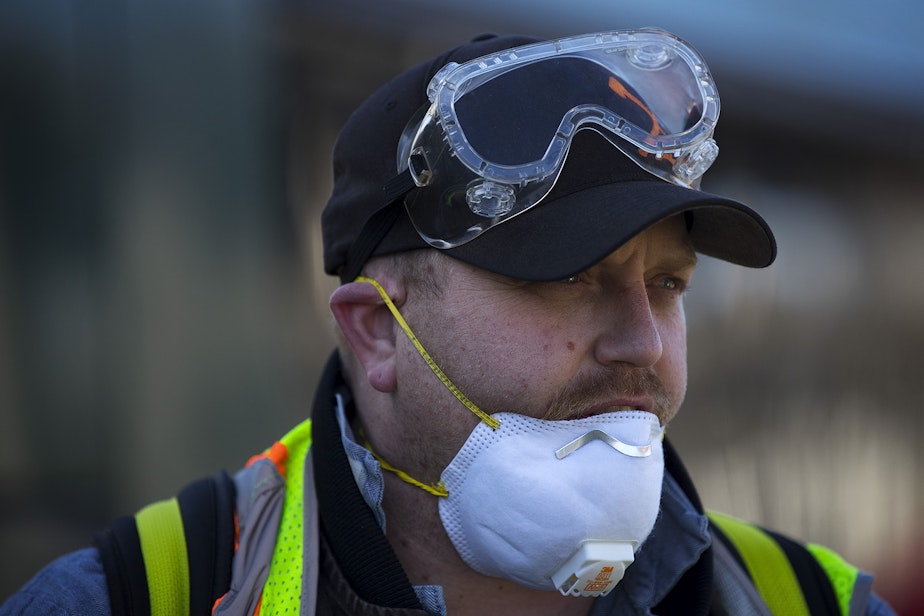Where have the masks gone? Some Seattle doctors and nurses want to know; others aren't concerned

Where are the N95 masks?
That’s what some Seattle-area doctors and nurses wanted to know this week as the coronavirus, a contagious respiratory virus, spread across the region.
At Harborview Medical Center, there was nary an N95 mask in site, according to a provider who was not concerned for their safety. Not every medical staffer wants to wear the masks, however, as they are uncomfortable to wear for long periods of time.
A University of Washington doctor elsewhere in the system told KUOW earlier this week that they would not have access to N95 masks even though they were in contact with sick patients.
“The stores are out. I might try to buy my own or ask friends for them,” the doctor said.
The doctor forwarded an email from UW leadership confirming they would not be receiving N95 masks, which are effective against respiratory viruses, and instead have been asked to use surgical masks, which are not. The doctor spoke on condition of anonymity for fear of getting in trouble with upper management.
Sponsored
UW Medicine put out a statement about protective gear later this week, saying they have "an adequate, though decreasing, supply."
UW is “working with our vendors to ensure that we will continue to receive needed supplies,” the statement said. “We have also asked for access to the National Stockpile of supplies.”
The UW will also use trained observers to make sure personal protective gear is put on and taken off correctly to avoid self-contamination.
Nurses at Swedish Medical Center told KUOW that they are also low on masks, and a travel nurse flying into relieve stressed staff at area hospitals are bringing their own masks.
At SeaMar community clinics, too, protective gear is on back order. And at EvergreenHealth, the community hospital in Kirkland at the heart of the coronavirus outbreak, nurses may also be short of protective gear.
Sponsored
Twelve people have died there since the outbreak was announced to the public last Friday. Carmen Gray, whose mother was admitted on Wednesday night to Evergreen, spoke with a nurse there who said mask supplies were dwindling.
“They are reusing [masks] by washing them with bleach,” Gray said. “They don’t have any choice.”
Gray said her sister is trying to launch a drive for masks and face guards for medical staff at Evergreen, where 12 people have died from coronavirus in the last week. Fire departments have varying amounts of gear.
Kirkland Fire has 10,000 masks from stocking up after the outbreak of SARS in 2003. Nearby in Redmond, there are just 600 masks in supply. Kirkland intends to share its masks with its neighbors.
On Thursday, the state received an initial shipment of protective medical equipment from the nation's strategic stockpile. Also on Thursday, Vice President Mike Pence visited the state. He spoke in front of a giant American flag and displays of medical supplies, including gloves, hand sanitizer and masks.
Sponsored
But according to the Washington Department of Health, the shipment represented only about half of the 233,280 N95 respirators, 200,000 surgical procedure masks, 60,000 disposal gowns and 5,000 protective eye shields the state has requested.
A health department spokesperson said the state expects to get the second half of the request, but it's not clear when. The Washington Post reported on Thursday that Washington's half-filled request was evidence of a shortage of vital medical equipment needed to respond to the growing crisis.
The supplies will be reserved for frontline health care workers engaged in the coronavirus response. Opinions differ about whether N95 masks are crucial. The Centers for Disease Control and Prevention recommends masks during outbreaks such as the coronavirus.
“Masks may be used in combination with goggles to protect the mouth, nose and eyes, or a face shield may be used instead of a mask and goggles,” says a 200-page document on protective gear.
But which masks?
Sponsored
A Canadian Medical Association Journal found that there was no significant different between N95 respirators and surgical masks in situations of respiratory infection. The N95 masks, however, were associated with “less face-seal leakage and less total inward leakage” compared with surgical masks.
The journal goes onto say that since SARS, there has been controversy within Canada around what protection to use, which has led to confusion among health workers. It concludes that there is insufficient data to determine that N95 masks are better than surgical masks.
Isolde Raftery is KUOW's online managing editor and can be reached at iraftery@kuow.org or via direct message on twitter @isolderaftery.

